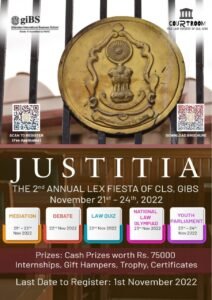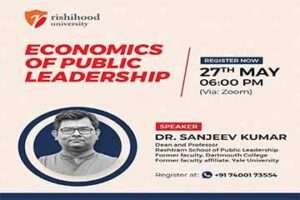National Workshop On Emerging Issues Of Reservation Policies In India by VIT School of Law on 24th September
Table of Contents
- About the University
- Subthemes
- Eligibility
- Mode and Location
- How to register
- Important dates
- Registration Fee
- Perks
- Contact Information
About the University
Vellore Institute of Technology (VIT) is a private deemed university located in Vellore, Chennai India, and was founded in 1984. VIT School of Law (VITSOL), the progeny of VIT, entered the legal education arena in 2014.
About the Workshop
The Reservation policy was brought forth by the first Justice Party Government during the last decades of the nineteenth century. The main aim behind the policy was to empower the downtrodden people in order to bring in a sense of belongingness. The resource of nature are common to everyone, but, when the economy, power, and influence takes the upper hand, people tend to be subjected and it causes a major fallback in society. The main objective of the reservation policy is to involve everyone in the functioning of the state without discrimination. Right from ancient times, a particular group has been dominated and oppressed, but the people cannot remain oppressed indefinitely as Article 14 of the Constitution entails fairness and equality to all. Though its been 75 years of Independence to date a section of society is being deprived of their basic rights, the reservation policy is an important initiative to uplift the aggrieved.
The Constitution lays down the principle of equality among equals, which is evident from Articles 15(4) and 16(4) wherein the constitution provides for a reservation to the socially and educationally backward sections of the society. The importance of the reservation policy in India has endowed the path of equality and it is further re-emphasized by various international instruments and covenants. The categorization of people to whom reservation must be given is ambiguous, causing perplexity in practical application, forgery to establish them under a particular identity to receive privilege is also a problem, being the reasons for which reservation policies are always in a debatable position. The reservation policy’s essence is to showcase equal opportunities for everyone to achieve equal success in a nation. This workshop will be useful to the Academicians, Research Scholars, and UG/PG Law Students and would serve the purpose of understanding the reservation policies of India to the best, its feasibility in society, and the problems that persist along with a solution-oriented approach.
Subthemes
- Affirmative Action
- Reservation Policy and Marginalized Sections
- Social and Financial Exclusion
- Positive Discrimination
- Constitutional Provisions of Reservation
- Reservation Policy in India
- Reservation in Education and Employment
- Reservation in Political Domain
- Reservation for the Disabled Women and Minorities
- Role of Indian Judiciary regarding the reservation
- Creamy Layer
- Vertical and Horizontal Reservation
- Internal Reservation
Eligibility
The workshop is open to Academicians/NGOs/Advocates/Research Scholars/UG/PG Students
Mode and Location
Offline mode at VIT School of Law, VIT Chennai campus, Kelambakkam – Vandalur Road, Chennai, Tamil Nadu 600127.
How to register
- The registration link is given at the end of the Post
Important dates
Registration Closes on: 23.09.2022
Workshop Date:24.09.2022
Registration Fee
For Academicians/NGOs/Advocates: Rs.300
For Research Scholars: Rs.250
For UG/PG Students: Rs.200
Spot Registration: Rs.350
Perks
- Certificates will be provided for all the presenters and participants
Contact Information
9840582063, 9655321779(Faculty Convenors), 8778117139, 6379551228(Student Co-ordinators)
Email: vitsolworkshop2022@gmail.com
Official linksRegistration:https://vitchennaievents.com/technovit/
Previous Posts
5th GNLU Essay Competition on Law and Economics
03rd GNLU Workshop on Law and Economics: Theories and Applications
Call for Papers Volume 3 Issue 1: International Journal of Advanced Legal Research
Legal Officer at Chennai Petroleum Corporation Limited
Research Assistant at the Kerala High Court
Joint Director (Law) at Haryana Electricity Regulatory Commission




